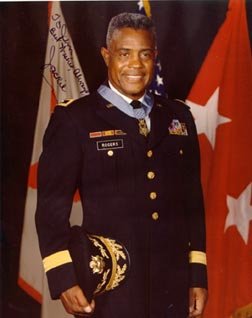Major General Charles C. Rogers: A Legacy of Valor and Leadership
Major General Charles Calvin Rogers, a distinguished American military officer, is renowned for his extraordinary heroism during the Vietnam War. As a recipient of the Medal of Honor, Rogers exemplified courage, leadership, and selfless sacrifice. His military career, spanning over three decades, left an indelible mark on the United States Army and its history. This article delves into his early life, military service, acts of valor, and enduring legacy.
Born on September 6, 1929, in Claremont, West Virginia, Charles C. Rogers was raised in an environment that instilled discipline, perseverance, and a profound sense of duty. His early education in West Virginia provided the groundwork for his future leadership endeavors. He pursued higher education at West Virginia State College, a historically Black institution, where he earned a degree in engineering. His academic achievements and leadership qualities culminated in his enlistment in the Reserve Officers’ Training Corps (ROTC), paving the way for his distinguished military career.
Upon commissioning as a second lieutenant in the United States Army in 1952, Rogers embarked on a distinguished career marked by exceptional leadership and unwavering commitment. During his early years, he held various command and staff positions, consistently excelling in artillery units. His technical proficiency, tactical acumen, and ability to inspire and motivate his troops earned him a steady progression of promotions.
During the escalating Cold War, Lieutenant Colonel Charles C. Rogers played a pivotal role in U.S. military operations, including deployments to Germany and other strategic locations. However, it was during the Vietnam War that he exemplified unparalleled valor, ultimately earning the nation’s highest military decoration, the Medal of Honor.
By 1968, Rogers commanded the 1st Battalion, 5th Field Artillery Regiment, 1st Infantry Division, in South Vietnam. His battalion was stationed at Fire Support Base Rita, a critical position that faced a relentless assault by North Vietnamese forces in November of that year.
Despite being significantly outnumbered, Rogers displayed extraordinary courage. Under intense enemy fire, he repeatedly exposed himself to direct danger, inspiring his troops, directing artillery fire, and personally engaging enemy forces. Despite sustaining multiple wounds, he refused evacuation, continuing to lead from the front. His heroic actions not only saved the lives of countless soldiers but also repelled the enemy assault, securing a vital U.S. position.
For his selfless and courageous leadership, Rogers was awarded the Medal of Honor on May 14, 1970, by President Richard Nixon. The citation underscored his unwavering bravery, unwavering dedication to duty, and unwavering commitment to his fellow soldiers.
Following his service in Vietnam, Rogers continued to serve with distinction, advancing through the ranks to attain the rank of major general. His assignments encompassed pivotal command positions within artillery and operational units. His leadership extended beyond combat, as he played a pivotal role in shaping military policies, refining artillery tactics, and mentoring the next generation of officers.
As the highest-ranking Black officer in the U.S. Army Artillery branch at the time, Rogers shattered racial barriers and inspired numerous young African American officers to pursue military careers. His unwavering commitment to excellence and ethical leadership garnered him widespread respect among his peers and subordinates.
Major General Charles C. Rogers retired from active military service in 1984 but continued to serve his country in various capacities. He transitioned from military leadership to spiritual guidance, dedicating his later years to faith and community service. This transformation reflected his deep sense of duty and compassion.
Major General Rogers’ life and career exemplified the highest values of the United States military—honor, courage, and selfless service. His battlefield heroism, exemplary leadership, and post-military contributions have left an indelible mark on the United States Armed Forces and American history. As a soldier, leader, and mentor, his story continues to inspire future generations to serve with distinction and uphold the values he so passionately defended.

